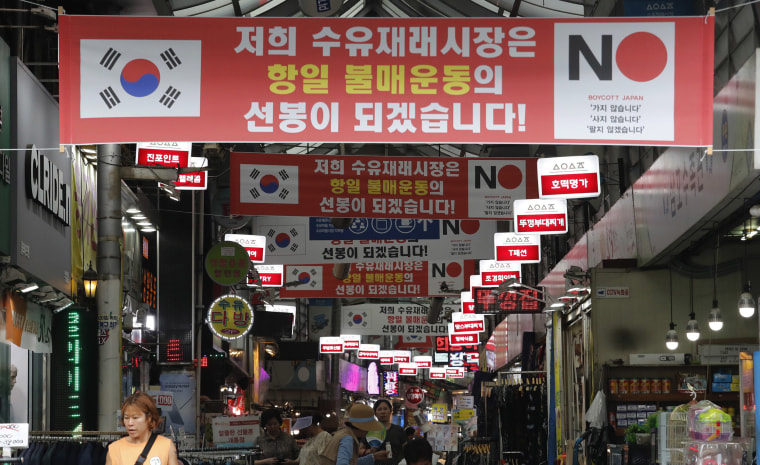SEOUL — South Korea said on Thursday it will scrap an intelligence-sharing pact with Japan, a decision that could further escalate a dispute over history and trade and undercut security cooperation on North Korea.
The decision is likely to be met with dismay in the United States, which fears weakened security cooperation. The accord is important for efforts to fend off North Korea's nuclear and missile threats.
The decision was announced after an hours-long debate within the presidential National Security Council. The pact was due to be automatically renewed on Saturday, unless either side decided to cancel it.
Japan created a "grave change" in the environment for bilateral security cooperation by removing South Korea's fast-track export status, citing security concerns without providing clear evidence, said Kim You-geun, a deputy director of the National Security Council.
"Under this situation, we have determined that it would not serve our national interest to maintain an agreement we signed with the aim of exchanging military information which is sensitive to security," Kim told a news conference.
South Korea would deliver a formal notice to Japan within the due date, Kim said.
There was no immediate reaction from Tokyo, but Japanese Chief Cabinet Secretary Yoshihide Suga said before the announcement that the deal bolstered security cooperation between the two countries.
"Although ties between Japan and South Korea are in a very tough situation, we believe we should cooperate with South Korea where cooperation is necessary," Suga told a regular news conference earlier on Thursday.
Intelligence sharing is key to developing a common defence policy and strategy, and all three countries are safer when they work together, Pentagon spokesman Lieutenant Colonel Dave Eastburn said.
"We encourage Japan and Korea to work together to resolve their differences," he said in a statement. "I hope they can do this quickly."
South Korea's foreign minister, Kang Kyung-wha, emphasised that the decision to end the intelligence pact was because South Korea had lost trust in Japan.
"We will continue to strengthen cooperation with the United States and develop the alliance," she told reporters in Seoul.
The U.S. envoy on North Korea, Stephen Biegun, raised the issue during a meeting with South Korea's deputy national security adviser, Kim Hyun-chong, before the NSC gathering.
The United States played a key role in initiating the hard-won pact, which was clinched in 2016 after a 2012 plan fell apart in the face of domestic opposition in South Korea toward military cooperation with old foe Japan.
Relations between the two U.S. allies are seen at their lowest since they normalised ties in 1965, plagued by bitterness over Japan's 1910-45 occupation of the Korean peninsula, which included the use of South Korean forced labour at some Japanese firms.
South Korea had warned it could reconsider the pact after Japan imposed export curbs on some materials vital to South Korean chipmakers and stripped South Korea of fast-track export status.
South Korea called the Japanese action retaliation for a South Korean Supreme Court order for Japanese companies to compensate some of their wartime forced labourers last October.
Japan condemned the ruling, saying the matter was resolved by a 1965 treaty normalising ties. Japan cited unspecified security reasons for the export controls.
